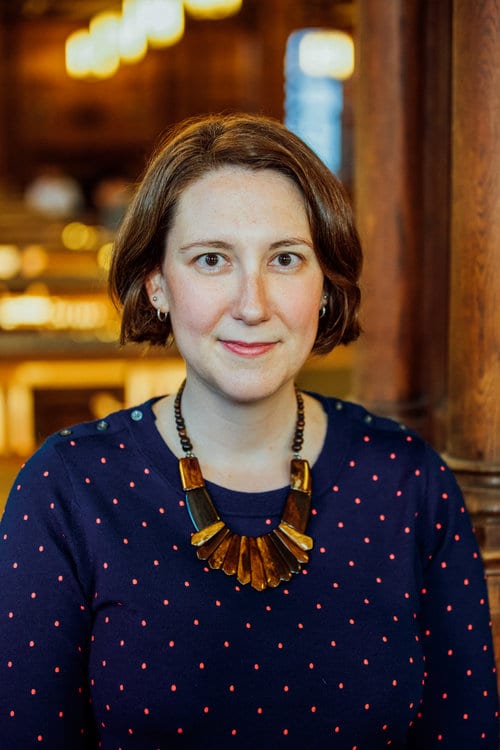Q&A with writer Kate Racculia
The gig economy accounts for more than one third (36 percent) of U.S. workers — that’s approximately 57 million people — according to a recent article in Forbes. While this cuts across many industries, from part time to full time work, the freelancer faces a set of unique challenges when it comes to financial planning versus the more traditional wage-earner.
 Ballast Advisors sat down with client and writer Kate Racculia for a Q&A, to discuss financial planning for freelancers from her perspective. Kate Racculia is a novelist living in Bethlehem, Pennsylvania. She is the author of the novels This Must Be the Place and Bellweather Rhapsody, winner of the American Library Association’s Alex Award. Her third novel, Tuesday Mooney Talks to Ghosts, was published by Houghton Mifflin Harcourt in October 2019. Kate shares her perspective on aspects of personal financial planning, such as budgeting inconsistent income, tax strategies for freelancers, and planning for retirement. Ms. Racculia is a client of Ballast Advisors, a fee-based financial planning firm with offices are located in Woodbury, Minn., Arden Hills, Minn and Punta Gorda, Fla.
Ballast Advisors sat down with client and writer Kate Racculia for a Q&A, to discuss financial planning for freelancers from her perspective. Kate Racculia is a novelist living in Bethlehem, Pennsylvania. She is the author of the novels This Must Be the Place and Bellweather Rhapsody, winner of the American Library Association’s Alex Award. Her third novel, Tuesday Mooney Talks to Ghosts, was published by Houghton Mifflin Harcourt in October 2019. Kate shares her perspective on aspects of personal financial planning, such as budgeting inconsistent income, tax strategies for freelancers, and planning for retirement. Ms. Racculia is a client of Ballast Advisors, a fee-based financial planning firm with offices are located in Woodbury, Minn., Arden Hills, Minn and Punta Gorda, Fla.
Q. Tell us a little about your career path in the freelance writing space?
A. The first time I was compensated for my writing was as a teenager–I was a teen correspondent for my local newspaper, which taught me early on that the freelance life–using my skills with the written word–had value, and I could and should pursue my interests and talents.
But, of course, because neither my life nor my career path has been anything close to a straight line, I went to school for a BFA in illustration and to graduate school, for an MFA from Emerson College in Boston. When I graduated–with a mountain of debt–I found a job as a writer in institutional finance marketing. I wrote my first two novels on weekends while I worked full time, for nearly 4 years in finance marketing and another 4 years in fundraising as a prospect researcher.
Only after my second novel was published, after more than 8 years of full time employment, did I feel comfortable taking the chance on freelance life.
Q. What steps did you take financially to make the transition to full time freelance work?
A.I knew I had to move to a more affordable place to live (Boston, I love you, but MAN are you expensive). And I didn’t have a contract for a book–all my books have been written on spec, which means I just wrote them without knowing if anyone would ever buy them. *Not* the most financially sound strategy! (As a very lovely consulting client said to me once, when we were discussing the perils of freelancing: “Girl, there are easier ways to make money.”)
But eventually I learned how to balance other forms of income and other occupations, that float the writing of novels until I have a manuscript that (thankfully) could account for a significant portion of my income.
So now, I work part time 15 hours a week at the Bethlehem Area Public Library, teach writing online for usually 3-4 10 week courses per year and consult on manuscripts for Grub ad hoc, write for freelance local publications, and the rest of my time is left for novel writing (or, right now, novel promotion!). So approximately 70% of what I do actively each week brings in pretty stable income–it’s not much, but it’s stable, a base I can build on. 30% of the week is spent on being a novelist, and that’s a risk and an investment that pays out over time.
Q. A huge challenge of freelance work is inconsistent income. In your writing career, can you shed any light on how you balance these challenges?
A. Diversifying my income sources has been so key. Both in terms of creating my ideal life balance–I like to be busy, and to have lots of things going on that are different from one another–and in terms of cushioning my budget. I do rely on my novel advances for my primary financial stability, but I can stretch those advances out over years because I have these other, more stable income sources to prop up my daily expenses. It’s also key to keep a low overhead life: I rent, don’t have kids. I paid off my car years ago, and don’t have any debt, which my many years in finance–and my first book advance–helped me eliminate. I like to travel, but I’m not a big impulse spender and always watch my budget for incidentals, the little things that add up over time such as eating out, etc. My biggest expenses, after rent and my healthcare and insurance, are probably my cats, who are aging. But I started my freelance life with a big cushion; I was in a position of terrific economic luck and privilege when I made the leap, and so far, so good. Even so, sometimes I’m not sure the uncertainty and stress is totally worth it, but I do love being the keeper of my own days. I love my flexibility and independence, and I’m going to keep living this life as long as I can.

Q. Another challenge is developing tax strategies when there’s no tax withholding. How has this worked for your writing career? What have you found most helpful?
A. I pay estimated quarterly income, which my accountant calculates as part of my tax package. Though I’ve had a few years when I didn’t pay the estimates; I expected those years to be leaner than they were, and it hurts like crazy to cut that massive tax to the IRS, but at least I have the money to do so. On those years when I have a windfall–I sold my book, or a book was optioned–I very conservatively sock away a portion of the gross in a savings account that I don’t even touch, or try to think about. I take out what I expect to pay in taxes proactively, and then it’s there when I need it.
Q. How have you planned for your retirement goals?
A. Whenever I get a windfall–again, if a book sells or a book is optioned–I put a chunk away to be invested. So instead of a small percentage of weekly salary trickling into my 401k every month, it’s like a deluge every 12-15 months. Again, like the savings account, I put it away, try not to think about it, let that compound interest be my friend.
Q. How do you manage insurance?
A. I do buy my own health insurance, which is kind of a bummer, but, again, I’m lucky: I’m generally healthy, don’t have a chronic condition to manage. So every year I go on the Healthcare.gov exchange, estimate my income, see if I’m eligible for a tax credit, and choose my health insurance. No professional or business liability insurance, thankfully; though the city of Bethlehem does require that I file for a yearly business license (to the tune of $30 or so), which I tack to my bulletin board with pride.

Q. Do you have advice for other writers/freelancers/creatives out there who need help in financial management, planning or strategy?
A. Take your time! It’s a marathon, not a sprint. Though it’s not really a race at all to live a particular kind of creative life–like, you’re still a writer if you’re working full time (with benefits) at an unrelated job. I was! For nearly a decade. And those full-time jobs were what put me in the best possible position to take a risk, at the time it was right for me to take it. Diversify your gigs, look for those other sources of income, too, that are related to your passions (for a writer: bookstores, libraries) but may be more stable or dependable.
Be disciplined–when you’re filling your own days, time can really run away from you, so try to make weekly schedules and habits about showing up–for yourself, for your work, for what you’re working toward. Daily walks (it is so critical to get outside and out of your head), friend and family time, TV time, dedicated, regular time in front of whatever you’re working on with your phone on silent in the other room. (And if you can? Turn off the internet.) Keep track of your receipts. If office supplies do it for you (I love ’em), invest in folders and fun colored sticky notes and keep your records as diligently as you can. And don’t be too hard on yourself. It’s very easy to feel alone when you’re, well, literally the only person in the office of one. Check in and see how you’re feeling, what you need. A freelance life is not one size fits all, but a bespoke balance that’s different for everyone.
Q. Where can we follow your work?
A. I’m on Twitter (occasionally) at @kateracculia, Facebook at @kateracculiawriter, and Instagram (with lots of cat content) at @gomezrac.
Financial Planning with Flexibility
Decisions for financial advice depend highly on the individual and must be built to be flexible with the changes that come along. Ballast Advisors strives to provide sound financial advice, backed not only by analysis and research, but by life experience and observations that can offer you a balanced and flexible investment portfolio.
For more information on how Ballast Advisors helps our clients like Kate, see www.ballastadvisors.com/
IMPORTANT DISCLOSURES
The opinions expressed are those of Ballast Advisors, LLC. The opinions referenced are as of the date of publication and are subject to change due to changes in the market or economic conditions and may not necessarily come to pass. Ballast Advisors, LLC is a registered investment advisor under the Investment Advisers Act of 1940, as amended. Registration does not imply a certain level of skill or training. More information about the firm, including its services, strategies, and fees can be found in our ADV Part 2, which is available without charge upon request. The opinions expressed herein are those of Ballast Advisors, LLC and are subject to change without notice
